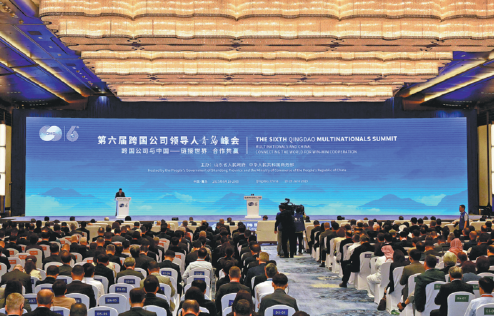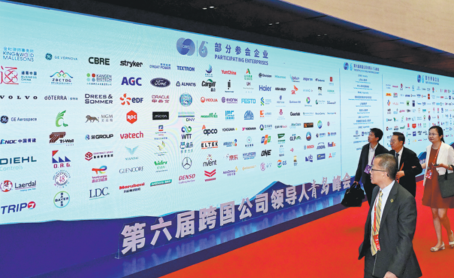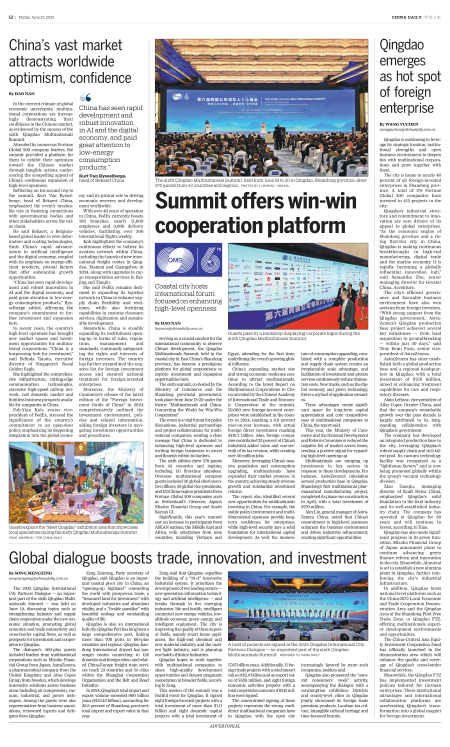
The sixth Qingdao Multinationals Summit, held from June 18 to 20 in Qingdao, Shandong province, drew 570 guests from 43 countries and regions.

Guests pass by a backdrop displaying corporate logos during the sixth Qingdao Multinationals Summit.

Serving as a crucial conduit for the international community to observe China's development, the Qingdao Multinationals Summit, held in the coastal city in East China's Shandong province, has become a prestigious platform for global corporations to explore investment and expansion opportunities here.
The sixth summit, co-hosted by the Ministry of Commerce and the Shandong provincial government, took place from June 18-20 under the theme "Multinationals and China: Connecting the World for Win-Win Cooperation".
The event is a vital forum for policy discussions, industrial partnerships and project collaborations for multinational companies, sending a clear message that China is dedicated to enhancing high-level openness and inviting foreign businesses to invest and flourish within its borders.
The sixth edition drew 570 guests from 43 countries and regions, including 131 first-time attendees. Overseas multinational company guests included 26 global chief executive officers, 56 global vice-presidents, and 133 China-region presidents from Fortune Global 500 companies such as Switzerland's Glencore, Japan's Mizuho Financial Group and South Korea's CJ.
Significantly, this year's summit saw an increase in participants from ASEAN nations, the Middle East and Africa, with enterprises from nine countries, including Vietnam and Egypt, attending for the first time, underlining the event's growing global influence.
China's expanding market size and strong economic resilience continue to attract multinationals. According to the latest Report on Multinational Corporations in China unveiled by the Chinese Academy of International Trade and Economic Cooperation at the summit, 59,000 new foreign-invested enterprises were established in the country in 2024, marking a 9.9 percent year-on-year increase, with actual foreign direct investment reaching $116.2 billion. Also, foreign companies contributed 25 percent of China's industrial added value and one-seventh of its tax revenue, while creating over 30 million jobs.
Moreover, leveraging China's massive population and consumption upgrading, multinationals have expanded their market presence in the country, achieving steady revenue growth and substantial investment returns.
The report also identified several new opportunities for multinationals investing in China. For example, the stable policy environment and multidimensional openness provide long-term confidence for enterprises, while high-level security lays a solid foundation for international capital development. As well, the momentum of consumption upgrading, combined with a complete production and supply chain system creates an irreplaceable scale advantage, and facilitation of investment and precise services continuously reduce transaction costs. New tracks, such as the digital economy and green technology, foster a myriad of application scenarios.
These advantages create significant space for long-term capital appreciation and core competitiveness of multinational companies in China, the report said.
This year, the Ministry of Commerce and the National Development and Reform Commission reduced the negative list of market access items, sending a positive signal for expanding high-level opening-up.
Multinationals are ramping up investments in key sectors in response to these developments. For instance, AstraZeneca's inhalation aerosol production base in Qingdao, Shandong's first multinational pharmaceutical manufacturing project, completed its phase one construction in April, with a total investment of $750 million.
Alex Lin, general manager of AstraZeneca China, noted that China's commitment to high-level openness enhances the business environment and drives industrial advancement, creating significant opportunities.
haonan@chinadaily.com.cn

